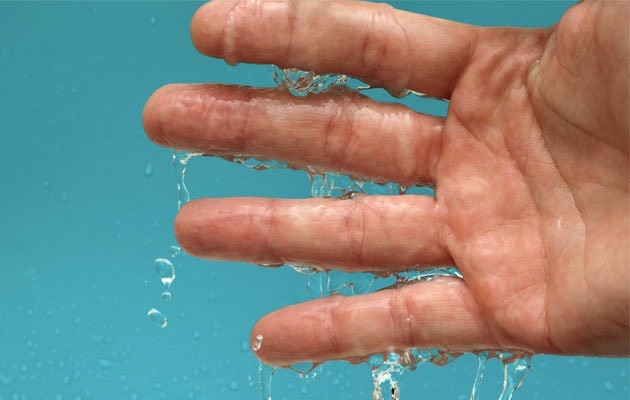Targeted Dermatology Treatments for Hyperhydrosis of Hands and Feet: Efficient Solutions
Targeted Dermatology Treatments for Hyperhydrosis of Hands and Feet: Efficient Solutions
Blog Article
Comprehending the Origin of Excessive Sweating and Its Influence On Daily Life
While it is frequently comprehended as a physiological reaction to regulate body temperature level, the triggers for too much sweating can vary commonly amongst people, including not only physical factors yet mental and additionally psychological aspects. By delving right into the origin triggers of hyperhidrosis and exploring its complex impacts, a much deeper understanding of this prevalent concern can be obtained, dropping light on the complexities that people grappling with extreme sweating navigate on a day-to-day basis.
Physiology of Sweat Glands
The guideline of sweat manufacturing, a crucial physical process, is largely managed by the activity of gland distributed throughout the human body. Sweat glands are classified into 2 primary kinds: eccrine and apocrine glands. Eccrine glands are the most numerous and are discovered in nearly all areas of the body. They play an important function in thermoregulation by producing a watery fluid onto the skin's surface area, which evaporates and helps cool down the body down. In contrast, apocrine glands are focused in areas abundant in hair follicles, such as the armpits and groin, and their secretions are thicker and milklike in appearance.
When the body temperature increases, either as a result of exercise, heats, or psychological stress, the nerve system causes the sweat glands to generate sweat. This sweat is made up mainly of water and electrolytes like salt and chloride. The procedure of sweat production is vital for keeping the body's internal temperature level within a slim, optimal range, highlighting the important duty sweat glands play in human physiology.
Triggers for Excessive Sweating
In understanding the origin creates of extreme sweating, it is essential to identify the triggers that can lead to this physical action. Physical physical effort, high temperature levels, and spicy foods are likewise known to cause extreme sweating in individuals vulnerable to this condition.
Moreover, medications such as some antidepressants, opioids, and certain supplements can additionally function as triggers for hyperhidrosis. Comprehending these triggers is important in taking care of too much sweating effectively - Treatment for hyperhydrosis of hands and feet. By recognizing and attending to the specific triggers that motivate excessive sweating in a specific, doctor can create customized therapy strategies to reduce this problem and boost the person's high quality of life
Medical Issue Associated
Associated with too much sweating are various medical conditions that can aggravate this physiological action. One common condition is hyperhidrosis, a condition identified by abnormally enhanced sweating that exceeds the my link body's thermoregulatory requirements. This can show up in focal areas like the palms, soles, underarms, or face, influencing a person's high quality of life due to social embarrassment and pain.
Furthermore, endocrine disorders such as hyperthyroidism, diabetic issues, and menopausal hot flashes can additionally lead to excessive sweating. Hyperthyroidism causes an overproduction of thyroid hormones, increasing metabolic rate and triggering sweating. Diabetes can induce sweating episodes, particularly during hypoglycemic episodes when blood glucose degrees drop as well low. Menopausal hot flashes, attributed to hormonal variations throughout menopause, can cause sudden and intense sweating, frequently accompanied by flushing and heart palpitations.
Furthermore, infections like hiv, tuberculosis, and endocarditis have actually been related to night sweats, a common sign known to interfere with sleep and influence overall well-being. These medical conditions highlight the varied variety of underlying variables that can add to too much sweating, requiring extensive assessment here and management by medical care professionals.
Psychological and Mental Elements

Impact on Social Communications
Excessive sweating can have extensive effects on a person's ability to involve comfortably in social communications. The noticeable indications of sweat discolorations or wet spots on garments can lead to humiliation and self-consciousness, causing individuals to take out from social situations. This withdrawal can affect relationships, limitation social tasks, and hinder personal and specialist development.

Furthermore, the stress and anxiety and self-confidence issues coming from excessive sweating can impact interaction and social abilities. People may struggle to concentrate on discussions, take part in group activities, or express themselves confidently. This can result in feelings of isolation and solitude, as social links come to be testing to keep.
Final Thought

While it is generally recognized as a physical action to control body temperature, the triggers for excessive sweating can differ commonly among individuals, encompassing not only physical factors yet psychological and additionally psychological aspects. By delving right into the root causes of hyperhidrosis and discovering its diverse impacts, a deeper understanding of this prevalent problem can be gained, losing light on the complexities that individuals grappling with too much sweating navigate on a daily basis.
Physical physical effort, high temperatures, and spicy foods are also recognized to set off too much sweating in people prone to this problem. By determining and addressing the certain triggers that motivate extreme sweating in an individual, health care suppliers can develop tailored treatment strategies to minimize this problem and enhance the person's high quality of life.
Too much sweating can have profound results on an individual's capacity to involve comfortably in social communications.
Report this page